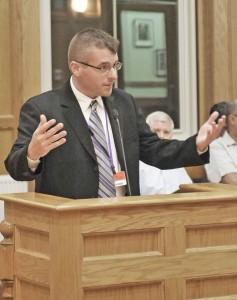BOSTON — Massachusetts public schools punish a disproportionately high number of minorities and students with disabilities with out-of-school suspensions, putting them at higher risk of dropping out or getting in trouble with the law, according to a civil rights group.
About two-thirds of those suspensions are for minor infractions, including non-violent, non-criminal and non-drug offenses, according to the report released Tuesday by the Lawyers’ Committee for Civil Rights and Economic Justice.
Black students received 43 percent of all out-of-school suspensions and 39 percent of expulsions despite making up less than 9 percent of students enrolled. Black students were almost four times as likely as their white peers to be suspended. Latino students were about three times more likely than their white peers to be suspended.
Students with disabilities were suspended from school at a rate three times that of their peers.
“If out-of-school suspension predicts dropout, why are we using it to address minor misbehavior?” co-author Matt Cregor said.
The report was based on disciplinary data from the 2012-13 school year released by the state Department of Elementary and Secondary Education. Massachusetts’ public school students lost at least 200,000 days in the classroom to discipline during the year.
A state education department spokeswoman said the department had no immediate comment on the study. A message left for the Massachusetts Secondary School Administrators’ Association was not immediately returned.
The study also found that charter schools are more likely to punish students than traditional public schools. One Boston charter school disciplined nearly 60 percent of its students with out-of-school suspensions.
“Given the extra steps parents take to enroll their children in charter schools, parents should not have to fear their children will be pushed out of them,” Cregor said.
The state’s overall out-of-school suspension rate was 4.3 percent, below the national average, but many urban districts had much higher rates, including 21.5 percent in Holyoke. Fall River, Lynn, Brockton, Springfield, and Worcester systems were all higher than 10 percent.
“Suspension rates as high as these should make us question whether we are meeting the needs of the students in our schools,” said Joanna Taylor, the report’s lead author.
Westfield Superintendent Dr. Suzanne Scallion said that the statistics cited “bear greater scrutiny.”
“We need to be consistent in the implementation of any consequences,” said Scallion speaking of the Commonwealth in general. “But we in Westfield aren’t believers that out-of-school suspension solves discipline issues.”
“I’m really proud of the work our principals and their teams have done with positive behavioral systems – where we acknowledge kids doing the right thing – and corrective discpline, where we make sure when a student does act out, we put a plan in place to make sure they don’t repeat (the behavior),” she said.
Initiatives to decrease the prevalence of out-of-school suspensions such as Westfield High School (WHS) Principal Jonathan Carter’s “Pathway to Good Standing” have garnered positive responses from school and district administration.
“Getting to class on time and not being in the hallways, no referral for students who continue to not get with the program – there are steps for them to get where they need to be,” said Carter of the initiative at a recent school committee meeting.
“Suspension is the last resort. It puts kids out of the building. It takes time out of learning. Quite frankly, it disenfranchises kids that are already disenfranchised.”
Carter has said that he doesn’t believe in school suspensions and external suspensions, a stance he has taken since working as a school administrator in urban districts such as Holyoke and Springfield.
“I worked throughout my career at reducing suspensions and arrests and providing students with an asset-based approach,” said Carter. “But we let them know that the adults run the building and are in charge of Westfield High School.”
Scallion believes the state’s high rate of suspension among minority students is the unfortunate result of the urban environments where many of these students live and are educated, cities where both poverty and gang culture are often ubiquitous.
“Comparing urban education to our district is really difficult. We’re not a Chelsea, Boston, New Bedford, Fall River or Brockton,” she said. “We don’t face the degree of issues that they do as urban settings. We have pieces of it, but we don’t have the intensity of the issues there.”
Scallion said that, while the district is extremely mindful of student behavior, those endangering school safety will not be tolerated.
“Safety is number one, but if (students) are acting out because something is going wrong in their lives, we want to make sure we address that as well,” she said. “We have a lot of students across the nation – and a few in Westfield – who are raising themselves.”
“We have kids who are stepping over a single drunken or drug-involved parent or living without a parent at home and getting themselves to school,” Scallion said. “Now there’s an at-risk kid.”
Scallion cited successful programs within the district, such as the mentoring program at Westfield Vocational-Technical High School (WVTHS), which has placed personal coaches into the lives of students, many of whom are growing up in immigrant families.
“I really do commend the efforts of counselors. Alison Kelly and her crew (at WHS), Henry Bannish and Christine Hupfer (at WVTHS),” Scallion said. “The principals – Stefan (Czaporowski, WVTHS), Jonathan (Carter) – you couldn’t ask for people who are more invested in the lives of the kids and that’s what we need.”
“If we want to educate students, we have to educate the whole child – educationally, socially and emotionally and I think we do a pretty darn good job,” she said.




